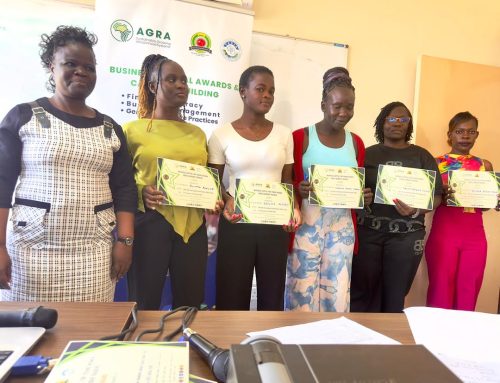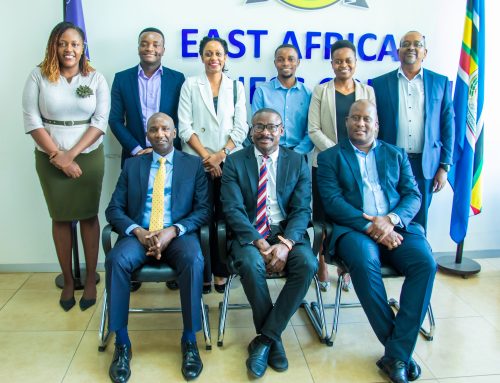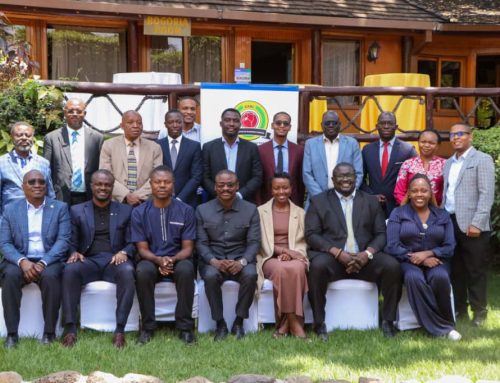Summary of the assignment:
| Nature of assignment | Short term |
| Location | East African Community (EAC) |
| Timeframe | 30 Working days |
| Reporting | To Executive Director/CEO |
- ABOUT EAST AFRICAN BUSINESS COUNCIL
The East African Business Council (EABC) is the umbrella body of the Private Sector in the East African Community (EAC). It brings together national private sector umbrella bodies, manufacturers, employers, bankers, insurance and transporters associations, chambers of commerce, corporates, and medium and small enterprises from the entire East African region.
EABC’s mandate is to represent and promote the interests of the EAC business community, provide value-added services that enhance trade and competitiveness, and to participate actively and positively influence legal and regulatory formulation to improve the business environment. EABC works with the major stakeholders such as the EAC Secretariat, Organs, Institutions and National Governments and provides input in policy discussion while advocating for the implementation of resolutions at the national level aimed at increasing intra-regional trade.
For effective implementation of the Regional PPD programme, EABC was selected by TradeMark East Africa as the lead implementing partner for the Private Sector Organizations.
- ABOUT TRADEMARK EAST AFRICA
TradeMark (Trade and Markets) East Africa is an aid-for-trade organisation that was established in 2010, to grow prosperity in East Africa through increased trade. TMEA operates on a not-for-profit basis and is funded by the development agencies of the following countries: Belgium, Canada, Denmark, European Union, Finland, Ireland, Netherlands, Norway, United Kingdom and the United States of America.
TMEA works closely with regional intergovernmental organisations, including the African Union (AU), East Africa Community (EAC), Intergovernmental Authority on Development (IGAD), Common Market for East and Southern Africa (COMESA), Southern Africa Development Community (SADC), national governments, the private sector and civil society organisations.
TMEA has its headquarters in Nairobi, Kenya, with successful operations and offices in EAC-Arusha, Burundi (Bujumbura), Democratic Republic of Congo (Bukavu), Ethiopia (Addis-Ababa), Horn of Africa (Hargeisa), Malawi (Lilongwe), Rwanda (Kigali), South Sudan (Juba), Tanzania (Dar es Salaam) and Uganda (Kampala). TMEA’s focus is on: Reduced Barriers to Trade and Improved Business Competitiveness.
III. BACKGROUND TO THE EABC TRADEMARK EAST AFRICA PROJECT
Under the TMEA’s Improved Business Competitiveness strategic objective, is the programme, “Public‐Private Sector Dialogue (PPD) for Trade and Investment”. This is a Regional and Country programme targeting mainstreaming advocacy throughout TMEA’s project clusters which are transport & logistics, trade facilitation, customs & tax, and standards & Non-Tariff Barriers (NTBs). The Regional Programme is implemented by the East African Business Council as the lead coalition partner, while the country programmes are implemented by the national private sector apex associations. The new approach presented and approved by the TMEA’s Board will foster closer collaboration across project teams and will contribute to results across all intermediate outcomes. The programme’s core objective is to enhance private sector organisations’ (PSO) capacity to proactively and positively influence decision‐making, accelerate dispute resolution, sustain political buy‐in, increase commitment and reduce overall programme risks in TMEA’s project clusters. This will increase trade and investment in the EAC. The Regional and Country Programmes will contribute to core TMEA corporate results outlined below:
- Reduce transport (road, rail, and air) cost and time along transport corridors by 10% and increase efficiency in private sector logistics services provision
- Enhance Customs and other trade‐related agencies efficiency (25% reduction in time to process trade documentation) through integrated trade management systems and greater inter‐agency collaboration.
- Reduced tariffs, taxes, and levies by 5‐8% overall (including sub‐national) reduce exemption regimes, CET, and increase import/export tax incentives
- Enhanced efficiency of Bureaus of Standards, reduce related costs and time by 10%, reduce counterfeit and sub-standard goods by 20% through enhanced inter‐agency collaboration and improved private sector compliance.
- Resolve 30% of all reported NTBs along TMEA project clusters within a year.
- Catalyzing a 10% increase in exports annually, 93,000 direct jobs and $425m additional investment after seven years in targeted sectors in the EAC under the Compact and TLCs through increased investment incentives.
Air transport industry is an important mode of transport for any country in the EAC region. It is more specifically important for the movement of people and perishable goods such as fresh produce including fruits and vegetables, floriculture related products and fresh fisheries and related products among others. Air transport is also particularly important for the growth of tourism, trade and investment in the region.
EAC Partner State countries have signed agreements at both regional and international levels which contribute to air transport liberalization. At the international level and multilateral level, the EAC Partner States are party to the Yamoussoukro Decision of 2000 and are also Members of the World Trade Organisation (WTO), respectively. At the regional level, in 1997, the Partner States undertook a civil services reform which led to the establishment of an autonomous Civil Aviation Authorities with responsibilities for safety and economic regulations of the air transport at the national level in various countries.
Despite the commitments of the EAC Partner States at the international level especially the Yamoussoukro Decision (YD) specifically in Article 3.1 on Granting of Rights stating that “State Parties grant to each other the free exercise of the rights of the first, second, third, fourth and fifth freedoms of the air on scheduled and non-scheduled passenger, cargo and/or mail flights performed by an Eligible Airline to/from their respective territories”, the EAC integration efforts through Common Market at the regional level involving liberalization of domestic air transport sector remains protected, thus translating into less accessible and unaffordable air transport for both cargo and passengers.
Regardless of the transformation of the air transport regulatory system, the air transport market in the EAC is still under tight regulation and control of the governments hence denying fair competition among the operators within the region. The region has continued to depend on restrictive Bilateral Air Service Agreement (BASA) in granting market accesses rights (schedules, frequencies, and capacities) among themselves despite the fact that the existing BASAs provide the opportunity to grant up to the 5th freedom traffic rights. The high cost of intra-EAC air tickets, therefore, makes it difficult to stimulate demand on air transport and this prevents the optimum use of capacity and frequencies as well as the freedom rights that have been agreed upon during BASAs negotiations.
At the national level, each of the Partner States implements cabotage laws in the transport sector, particularly in the air transport sector limiting the operation of planes in various Partner States limiting planes landings to only a few international airports. In addition, Partner States planes are treated as international flights, therefore having to pay charges equivalent to those paid by flights from extra- EAC region.
According to the 2016 Study on ‘Costs and Benefits of ‘Open Skies’ in the East African Community the quantitative analysis based on data from East Africa, provided robust and compelling evidence that liberalisation leads to 9% lower average fares and a 41% increase in frequencies which stimulate passenger demand. Furthermore, the Study established that it is estimated that liberalisation between five EAC Partner States Burundi, Kenya, Uganda, Tanzania and Rwanda, could result in an additional 46,320 jobs and USD202.1 million per annum in Gross Domestic Product (GDP).
Despite the advantages that are envisaged by full liberalization of air transport and the commitments through the EAC integration efforts embedded in the Common Market Protocol, protection of the EAC skies has translated into less accessible and affordable air travel and cargo carriage thus contributing to a high cost of doing business. While the region is faced with such aviation cost drivers, these should be linked to the progress towards the extension of freedoms and consequently full liberalisation of African Skies through the formation of the Single Air Transport Market in Africa (SAATM); and the adoption of the draft EAC regulations on single air transport.
The East African Business Council (EABC) is concerned with the high cost of air transport that is brought by exorbitant taxes, charges, fares and fees in the region attributed to the slow pace of liberalisation. To address this EABC is commissioning a study to analyze the effect ofopen skies and its underlying benefits, scan through the regulations on aviation taxes, levies, charges on the cost of doing business in the EAC. While undertaking the study, the consultant is expected to show how the cost drivers, should be linked to the progress towards implementing the Yamoussoukro Decision and full liberalisation of the African skies through the formation of the Single Air Transport Market in Africa (SAATM); and the adoption of the draft EAC regulations on single air transport.
Specifically, the study will assess the following:
- operational costs such as fuel costs, landing fees, parking and handling fares, catering charges, varying taxes, levies, passenger service charges, and navigation charges and their contribution to the cost of freight and travel.
- regulations (including taxes, levies and other related charges), and their effect on doing business within the EAC,
- India’s Open Skies Policy on Air Cargo of 1990 (Aeronautical Information Circular AIQ No. 18/1992) to review to establish whether such arrangements exist in the EAC region for benchmarking and if there are any legal frameworks that could block this possibility.
Specifically, the consultant shall undertake the following:
- taking into consideration regional travel traffic (passengers and cargo and aircraft movements) volumes and trends over the past five years.
- taxes, fares, levies, and fees as cost drivers on travel as well as doing business in the EAC region,
- on taxes, levies and other fees and assess their effect on the cost of doing business in and make recommendations for the appropriate regulatory reforms that can enhance the accessibility and affordability of the air transport sector in the EAC,
- An advocacy policy brief on their aviation costs and their effect on the aviation sector and the impact on impact on doing business in the EAC.
VII. DELIVERABLES
The key deliverables include:
- the impact of aviation charges, taxes, fares and fees as cost drivers on travel as well as doing business in the EAC region
- the appropriate regulatory reforms that can enhance accessibility and affordability of the air transport sector in the EAC with regard to aviation charges.
VIII. METHODOLOGY
- industry stakeholders such as airlines operators, aviation regulators, key users of air freight such as the horticultural industry, EABC, TMEA, national business apex associations, sectoral associations, funders in the sector and any other key stakeholders.
IX. QUALIFICATIONS AND EXPERIENCE
A suitable candidate should hold the following qualifications and key competencies:
- Academic and Professional Experience: A Master degree or postgraduate qualification in any of the following fields, Statistics, Economics, Business Administration, International Trade, Trade Policy and Law or any other relevant field is required.
- Work Experience: A minimum of five (5) years of demonstrable experience in Air Transport Service advocacy-related research and regional trade-related issues. The consultant must have the capacity to carry out the study within the determined timeframe.
- Proven track-record in related assignments
- Knowledge of EAC Integration, international trade and demonstarted knowledge of the Aviation Sector in the region and the relevant agreements that govern it.
- Languages: Fluency in oral and written English is required as it is the main EAC working language. Good working knowledge of French and Kiswahili will be an advantage.
- Additional Skills: Excellent computer skills (Microsoft Office (Word, PowerPoint, and Excel), Email, analyticaltools/software for data analysis, experience in working with internet searches, online databases, and data retrieval) are required.
- MODE OF PAYMENT
| Time | Amount to be paid |
| Upon submission of the inception report | 20% of the total amount |
| Upon submission of the draft report | 20% of the total amount |
| Upon approval of the final report | 60% of the total amount |
- EVALUATION CRITERIA
Explanation of the Combined Financial and Technical Evaluation. The combined score is obtained by attributing the technical weight T (80/100) to the technical score St (Max Points as per ToR x score awarded by evaluator/100) and the financial weight P to the financial score (Sf).
The formula for the combined evaluation (S) is as follows: S = St x T + Sf x P. This will be calculated for each consultant proposal admitted to the financial evaluation.
Total score (Technical + Financial) = 100 points The Contract shall be awarded to a bidder obtaining the highest combined technical and financial scores. Proposals not complying with the terms and conditions contained in this ToR, including the provision of all required information, may result in the Proposal being deemed non-responsive and therefore not considered further.
| Evaluation on; | Maximum Award |
| Experience | 30 |
| A minimum of five (5) years’ demonstrable experience in Air Transport Service advocacy-related research and regional trade-related issues. (3 assignments for 5 marks each) | 15 |
| Knowledge of EAC Integration, international trade and demonstrated knowledge of the Yamoussoukro Agreement concerning the Liberalization of Access to Air Transport Markets (3 assignments undertaken for 5 marks each) | 15 |
| Approach and methodology | 30 |
| Adequate understanding of the Terms of Reference | 10 |
| Proposed Methodology and work plan in responding to the TORs. | 10 |
| The consultant must demonstrate the capacity to carry out the study within the determined timeframe as per the ToRs. | 10 |
| Experience and qualifications | 10 |
| Academic and other professional Qualifications: A Master degree or postgraduate qualification in any of the following fields; Economics, Transport Economics, Business Administration, International Trade, Trade Policy and Law or any other relevant field | 10 |
| Overall technical score | 70 |
- THE APPLICATION PROCESS
Send proposals to EABC Secretariat MAFAO HOUSE, 9th Floor, Old Moshi Road, and P.O. Box 2617, Arusha, Tanzania or to procurement@eabc-online.com clearly marked “CONSULTANCY SERVICES TO CONDUCT A STUDY ON AIR SPACE LIBERALISATION, COST DRIVERS AND REGULATIONS (INCLUDING TAXES, LEVIES AND OTHER RELATED CHARGES), ON THE COST OF DOING BUSINESS WITHIN THE EAC”. The proposal should include an updated curriculum vitae, proposed methodology, work plan. A separate password-protected Financial Offer detailing all activity expenses and logistics should be submitted.
The deadline for submission is set as 11th May, 2022 at 17:00rs East African Time.
EABC is an equal opportunity employer thus recruitment is on merit and with no regard to one’s age, colour, gender, marital status, disability or impairment, race or creed. Canvassing shall lead to automatic disqualification. Environmental aspects will be taken into consideration.




